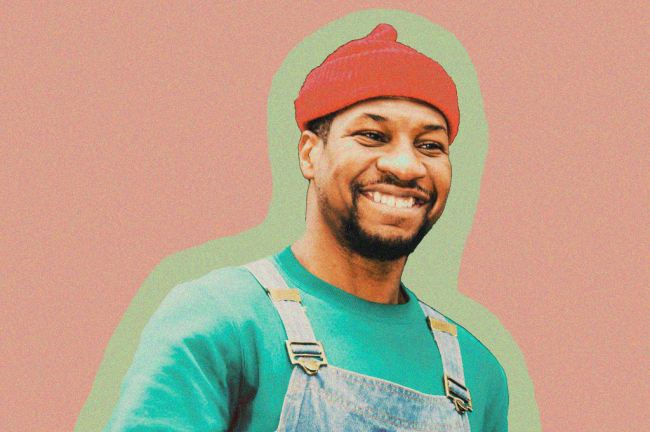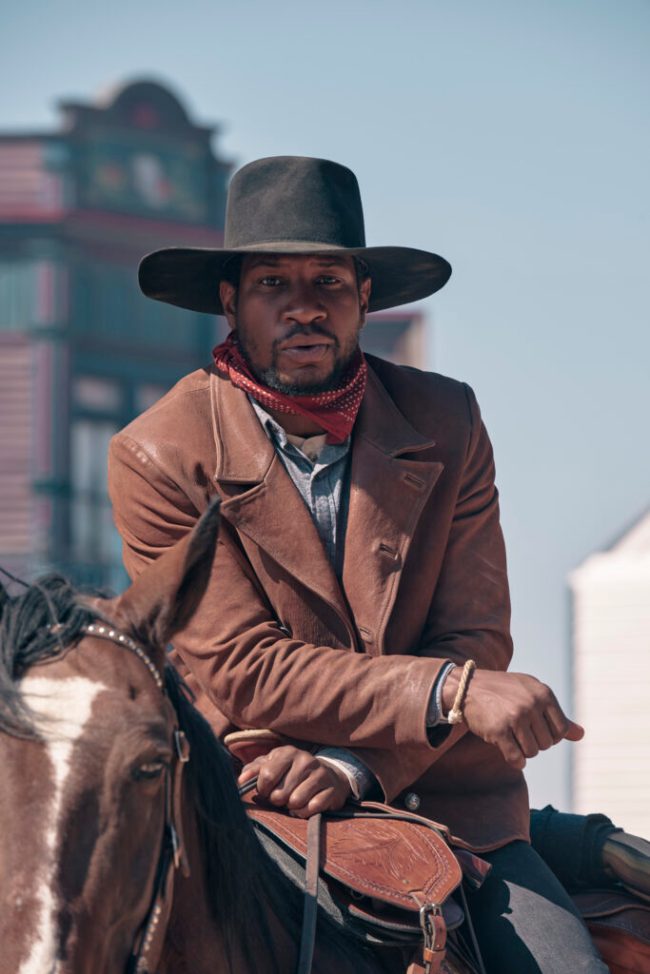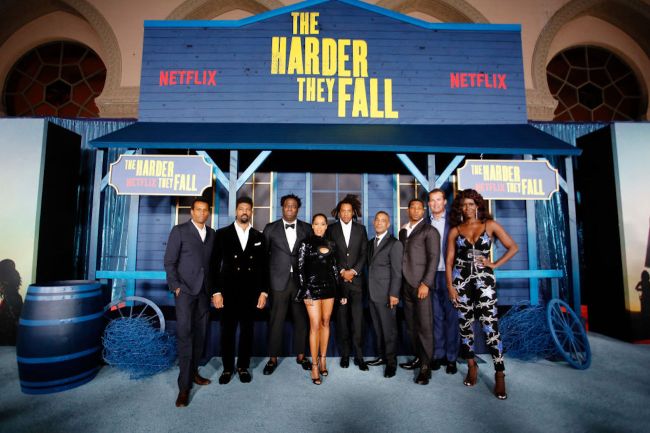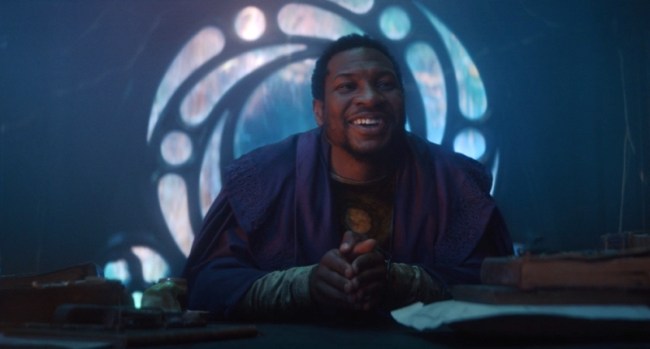
Getty Image
Given the nature of Hollywood these days, once an actor accepts a role in the Marvel Cinematic Universe, their profile reaches a new, higher plane of stardom as their work will now be seen by millions, if not billions of people across the globe. In terms of all-time franchise earnings, the MCU’s $22.5 billion (as of early 2021, according to CNBC) puts the now 26-film franchise in first ahead of Star Wars by a whopping $12 billion, just to provide some further perspective on how historically massive its become.
As such, there’s no denying that Jonathan Majors taking on the role of He Who Remains a.k.a Kang the Conqueror in Loki, Ant-Man and the Wasp: Quantumania, and likely future MCU projects has accelerated the 32-year-old’s rise to stardom. But here’s the thing about Majors, which comes across as clear as his showstopping monologue in Loki when you’re watching him on the big (or small) screen or talking to him for an interview: with or without the MCU, Majors is, and will be, a star.
Perhaps no film in his already wildly impressive filmography — a filmography that includes the likes of Hostiles, The Last Black Man in San Francisco, Da 5 Bloods, and Lovecraft Country — epitomizes that surety of success more than The Harder They Fall, which features Majors in the center of an all-Black cast that boasts some of the generation’s most titanic talents. Idris Elba, Regina King, Lakeith Stanfield, Delroy Lindo, and Zazie Beets are just some heavy-hitters that populate that the gorgeously technicolor Western world renderer by director Jeymes Samuel, and yet, its Majors’ Nat Love that’s fixated at the center of it all, both paying homage to and laying new groundwork for iconic Western gunslingers.
Ahead of the film’s release, BroBible’s Post-Credit Podcast had a chance to speak to Majors about creating a compelling Western hero, carving out his path in Hollywood, getting into “the zone”, his future as Kang the Conqueror, and more.
Introductions and the Western Genre
Eric Italiano (BroBible): Congrats on The Harder They Fall. I had an absolute blast with it, I had a blast with your character specifically. For you, Jonathan, what do westerns mean to you? Did you grow up watching them, is there one in particular that you love, or is this simply you trying to diversify the type of roles that you take on, which I think has been a real strength of your career so far.
Jonathan Majors: I love movies, and I feel that some of the most profound movies for me were westerns, some of the most entertaining films growing up were westerns, for instance, which cashing a Sundance loves that film. And also, I’m sorry, just a second… WOAAHHHHHH!
At this point, ‘The Harder They Fall’ director Jeymes Samuel enters the room and the pair bro out for a bit. It’s a joy to watch.
EI: You were on Butch Cassidy.
JM: Yeah, Butch Cassidy and the Sundance Kid. Love that film, one of my favorite films. The Lonesome Dove series is also something I really, really enjoyed. And Gunsmoke — just the opening of Gunsmoke — BANG BANG BANG BANG! That’s in my head from my grandfather, and my mother, her favorite picture growing up was Little House on the Prairie, so we used to watch those dramas in the house all the time. So they kinda seeped themselves into my conscience for what storytelling was.
Creating an iconic Western hero

Netflix
EI: That actually leads me into my next point because given that Westerns are such an iconic staple of film, I’m curious about the process of adding your own layers and quirks to an archetype that has such a rich and established film history, and how did you do that for your role.
JM: You nailed it there, because you think Western, and what do you think? What we just said: Butch Cassidy and the Sundance Kid. So you’ve got those two cats, Paul Newman and Robert Redford, playing that iconic duo. And then you have, of course, Clint Eastwood and John Wayne. And those four gentlemen, as handsome and dangerous as they are, all have one thing in common that I do not have in common with them. And so the elephant in the room is that here’s a black Western hero, which we’ve not seen before. So at the same time, with any art, there’s a standard, and so you first must understand the standard. And one of the things I understand about my process — let’s just take these four individuals, for instance — all these four characters have in common, and that is there’s a certain amount of presence with them, there’s a certain amount of accouterment: the hat, the horse, all these things, and the thing that makes those four characters distinct s in the observation of how they use those things and the stories they tell us. So with Nat Love, my biggest thing was okay: we got my horse, we got the hat, the guns — but what makes him different? One, truth be told, I’m a lot younger than those guys.
EI: But still, I think you have a real weight — your character still carries a very world-weariness to him.
JM: I agree with that, but there’s also something that happens with being a younger man. Your aggression is a little different, isn’t it? Your risk-taking, it’s a little different. And there’s a certain confidence because Nat has made his way from slavery. The autobiographic info is that Nat Love was born a slave in Tenessee and then journeyed all the way to the West in the elements of our story. What type of individual is that? And so one of the big things I was focused on is the level of stakes and the love of risks that Nat was willing to take. And on a scale from 1-10, he was pretty much at a 10. He was willing anything to exact revenge on what it is that was done to him because what was done to him was so violating.
The roles he pursues
EI: Where does badass anti-hero romantic slick gunslinger rank in terms of the types of parts that an actor can take on? And do you pursue specific types of roles like this, or do you just react to what comes your way? And if so, what’s next on that list?
JM: What’s next on that?
EI: Well, if you’re consciously planning the type of roles that you wanna take on, do you have a road map or…
JM: I will say this: it’s quite flattering that you say all those things about Nat. You know what I mean?
EI: Oh, dude, I just thought the character was so cool, I thought you were so slick. So I just imagined being a gunslinger that is also romantic and cool as hell is probably as good as it gets for acting.
JM: It’s cool, man, because really, it’s like the Constant Gardener theory: where you just keep working on these small things. You don’t know he’s gonna have that romantic side to him in the beginning at the church. You don’t know he you can ride a horse as he can ride it. It’s morsels. This is who is at *this* moment and this is who he is at *that* moment. And then, when it’s all said and done, 2 hours and 10 minutes later, you go… how?! How does this man… How does this happen?! And I ask the same question: because to me, my only objective — that’s outside of a script — is to look at everybody individually and you have to find what’s peculiar about someone and highlight that. And if he’s confident that in the peculiarity of himself, it’s just natural. It’s just natural. The peacock doesn’t feel more pride because he can do the tail thing. It’s just what a peacock does. It’s us that goes, “DOG, that is such a cool bird.” He’s just doin’ him. And Nat Love is just doin’ Nat Love.
Getting into “the zone”
EI: Plus with that name, you can’t help but be cool as hell. Let me ask you, how do you get in the zone for emotional scenes, which are some of my favorite parts of the film. The ones with Zazie Beets or Idris Elba. And how does that compare to getting into the zone for a scene like you did for Loki? Is it the same process? Because they’re different emotional beats, but they’re both big climax moments.
JM: There is no zone.
EI: You are the zone.
JM: One of the things that’s imperative for me is — it’s funny, because when Jeymes came in here… I never showed up to New Mexico [to film The Harder They Fall]. Nat Love showed up in New Mexico. There’s a certain process where I just want to do a good job. And one of the best things for me is that I know myself to a degree — I’m still learning — but I know myself, and I know that it’s best for me not to act.
EI: And just be.
JM: Yeah, and just try my best to do that. What I do is just take it on. It’s uncomfortable at first but you just take it on. Let’s go wear cowboy boots for the next eight months. I’m gonna smoke for the next eight months. You surrender to it. And I’m gonna think, and I’m gonna let that hurt, and examine that hurt of what it would be like for my parents to leave and be taken from me. I’m just gonna sit with that, and continue to sit with that, and you do your work, and you look at the psychoanalysis of all of it. But you just try to really believe it. And the thing is, you’ll believe it if there’s nothing else in the way that tells you otherwise. You just begin to push things out of the way that distract from Nat, from the aforementioned He Who Remains. And then it’s all about Idris Elba, it’s all about Rufus Buck. If I know the thing that hurt me that much — his name is Rufus Buck and he looks like — well, one of the sexiest men alive — Idris Elba, right?
EI: Oh, absolutely. Even back then in the wild, wild west, I was like, “Damn!”
JM: Right, so when you see that person, you will feel those things. And then you just try your best to get out of the way.
EI: What I’m hearing from you is that the zone is not a place to reach but it’s a state of being.
JM: Yeah, I love that. Yeah, as an approach.
The Harder They Fall sequel

Getty Image
EI: Like many movies these days, this film teases a sequel, and given the star power of this movie, the second one would have to come just as correct. Are there any ideas of who you would hope to work with in The Harder They Fall-er?
JM: The relationship that was established — as you saw, Jeymes just came in — between the team that built this thing, that being Jeymes Samuel, [producer] James Lassiter, Shawn Carter… And because of the nature of Nat in the film, as the protagonist of this particular world, we just have to get busy again and figure out what other information, what other thing we can explore. But it would have to come correct. And if anybody can do it, I think it would be that core.
EI: A lot of films these days tease sequels, but this one felt natural and right, which is a hard thing to do.
JM: And it’s dope because it’s original content.
What Kang the Conqueror brings to the MCU
EI: Now, I’ve only got a few minutes left, so I just wanna swing over to your newly burgeoning Marvel career now. Every time I talk to somebody who works in Marvel, I always feel sort of bad because I can only imagine the amount of questions that they get. But it is part of my job, so I do wanna ask you: what are you hoping that Kang brings to the MCU that hasn’t been done before? And what about that character is appealing to you as an actor?
JM: What’s appealing to me about the character is that I get to work. Which means I get to explore my own humanity and put that on display for — you know, because it’s Marvel — a *massive* audience, and that’s really cool for me. When I was sitting in North Carolina or drama school in New Haven, it’s what you always wanted. And what I feel Kang brings to the MCU is something for our heroes to go up against, and that’s cool, because you learn more about them. There’s conflict and I get to be a part of that. I’m sorry, but…
The moment he found out he’d be playing Kang

Marvel Studios
EI: No, no, no, by all means, man, I get it — I’ve just got to fish a bit, I’ve gotta try. Let me ask you one final question related to Marvel that’s not quite as deep. Do you remember the exact moment that you got the call that you had been cast as a major MCU villain, and what was that like for you?
JM: That was beautiful, and I can speak to that. I was in New Mexico shooting The Harder They Fall. I was actually smoking a cigarette or something, and my team called. I was with a very dear friend of mine, and we were just sitting, and I had to walk off. I was like, ‘What? They want to do what?’ And the thing about it is, initially it’s just a job, and I was like, ‘Okay, cool,’ and then as it began to unfold, it became what it is. And who knows what it will be.
EI: I hear you. I think I speak for all fans, not only in terms of Kang, but in terms of your career as a whole, it’s been a thrill watching you, watching you work. Your early filmography is incredible and I think you’re an immense talent. Sir, congratulations on the film, it is awesome and you are awesome in it. The Harder They Fall hits Netflix on November 3. Jonathan Majors, thank you so much, sir.
JM: Thanks, my brother, that’s so sweet. Thank you, man.
The Harder They Fall hits Netflix on November 3.